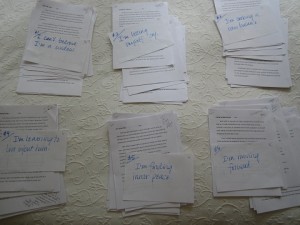All of us have been driving when suddenly a torn patch of road shakes the car and has us swerving to avoid potholes. The road of life can be like that, too, presenting us with sudden rough patches in finances, marriages, friendships, or our spiritual lives. But if we take our time, if we slow down enough to carefully navigate around the cracks and dips, we can avoid potholes-worth of problems.
God is linked into this idea, too, knowing that when we calm our pace, we’ll hear him better. And when we hear him better, we’ll learn how to avoid trouble.
All of us remember Mr. Rogers of public television fame. He was popular with children because he moved at a slow speed, waiting for them to catch up if necessary. Although adults sometimes made fun of his unhurried pace, truth be told they appreciated him for it, too.
I recall one evening on Johnny Carson’s Tonight Show when Fred Rogers was a guest. At the beginning of the interview, Johnny asked questions tongue-in-cheek, winking at the audience. When he asked Mr. Rogers to sing one of his original songs, Fred looked Johnny straight in the eye and without a trace of hurry sang:
“It’s you I like–
Every part of you,
Your skin, your eyes, your feelings
Whether old or new.
I hope that you’ll remember
Even when you’re feeling blue
That it’s you I like…”
By the end, Johnny was wiping away a tear of emotion after having genuinely absorbed the sincere message of the song. Mr. Rogers’ calculated singing had slowed Johnny down long enough to hear the meaningful message.
What an effective illustration of our communication with God. So often we come into his presence flustered and rushed, hoping to have a quick, economical session with him. I’ve even initiated prayer times by asking God to make our few moments “efficient.” But hurried communication with the Almighty isn’t good communication, and unless we approach God like Mr. Rogers approached Johnny Carson, slowly and deliberately, we can’t expect much in return.
When we slow down enough to appreciate and adore him, good things will happen. If our minds are already on the next event, not much of significance will occur. So how do we bring ourselves to a screeching halt in a high-speed world? Even if we do it bodily, how can we keep our brains from buzzing?
We do it the same way we avoid highway potholes: by focusing on the damage we’ll cause if we blast into them, which then motivates us to slow down enough to see and avoid them. Likewise, if we ponder the damage to our spiritual lives as we race in and out of God’s presence, we’ll slow ourselves down enough to hear him.
And it’ll be then that he’ll let us know how to avoid all the rough patches life’s road has to offer.
“Do not be in a hurry to leave the king’s presence.” (Ecclesiastes 8:3)







